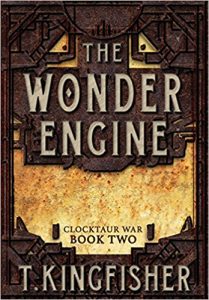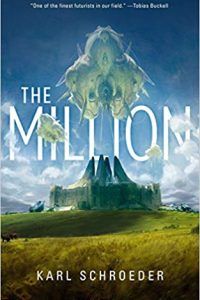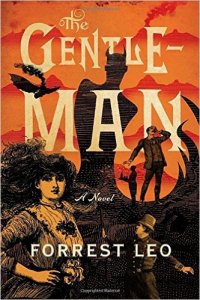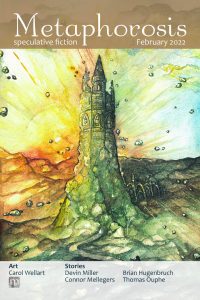Liz Bourke Reviews The Wonder Engine by T. Kingfisher
 The Wonder Engine, T. Kingfisher (Red Wombat Tea Company 978-1-386-528876, $3.99, ebook). February 2018. Cover art by Ursula Vernon.
The Wonder Engine, T. Kingfisher (Red Wombat Tea Company 978-1-386-528876, $3.99, ebook). February 2018. Cover art by Ursula Vernon.
Have you read The Wonder Engine yet? It’s the second book in T. Kingfisher’s (the penname for Ursula Vernon) Clocktaur War duology, following on from last year’s Clockwork Boys. While Vernon has the weird, wild, and occasionally dark Digger to her name, as well as her short fiction and illustrated books, as T. Kingfisher, her work has generally avoided the kind of territory where entertaining characters die horribly. The Wonder Engine, while still full of Vernon’s trademark practicality, compassion, pragmatism, and humour, reaffirms Clockwork Boys‘ somewhat darker direction. There’s still plenty of practicality, compassion, pragmatism, and humour – but this time a lot more of that humour is the gallows kind.
We met the condemned band of Slate (forger extraordinaire, competent thief, team leader), Brenner (assassin, Slate’s ex-lover), and Caliban (disgraced former paladin with a dead demon decaying in his soul, currently in love with Slate) in Clockwork Boys. They’ve been sent to stop the bands of so-called Clockwork Boys sent out from Anuket City to conquer their city of origin, and if they fail, the curse implanted in their skin will kill them. Learned Edmund, a 19-year-old scholar and celibate brother from a very sheltered (and very intellectual) order, rounds out their number, and during the course of Clockwork Boys, Slate saved the life of a gnole (small and badger-like sentient) called Grimehug, who forms part of their company as The Wonder Engine opens.
They’ve survived the journey to Anuket City. But Slate has history in Anuket City – the kind of history that cuts you open and tortures you to death because you pissed off the wrong people. Neither she nor her companions know where to start looking for the creators of the Clockwork Boys, which are called clocktaurs in Anuket City. And even should they find them, they have no idea how to destroy the clocktaurs, or persuade their creators that the war should end. Such are the perils of being a forlorn hope. On top of this, Slate’s still not quite sure how to deal with her frustrated attraction to Caliban – a very pretty man, but one with a terrible habit of putting his foot in his mouth.
But there are a lot of gnoles in Anuket City, and they go everywhere. Grimehug, who may or may not have an agenda of his own, is willing to help Slate find out about the clocktaurs. And Learned Edmund (when not being fascinated by gnole culture and customs) makes contacts of his own among the artificers. Slate, Brenner, and Caliban return to Slate’s old haunts, where Slate is desperately hoping not to be recognised, and look for information.
They find useful information, but Slate’s past finds her. This leads to a harrowing interlude for both Slate, faced with the prospect of torture and execution, and Caliban, who is really not okay with letting this happen. (It does accelerate their courtship to the just jump his bones already stage, though.)
It turns out the solution isn’t as easy as finding the people who want a war and, ah, convincing them to stop. Or destroying the factory that makes clocktaurs. No: the clocktaurs are produced by a wonder engine, an artefact of strange power from a previous age, and fuelled by bound demons and dead flesh. The war continues because it is better to give the clocktaurs a target than to risk them turning on their tentative masters… and Slate, Caliban, and Brenner have to destroy the wonder engine.
No one’s ever managed to destroy a wonder engine before.
This is an excellent book. Tense, fast-paced, with some brilliantly bizarre world building, it demands your attention. Its characters – flawed, complicated, human – are enormously compelling, and their self-discoveries and betrayals, dark nights of the soul and bitter gifts of god-given grace, are underlaid with a great deal of narrative kindness. The Wonder Engine is a book – and the Clocktaur War is a duology – that understands human flaws, finds them gently forgivable, and understands the grace of gods to be as much a terrible, incomprehensible burden as a gift. Read it. But start with Clockwork Boys, or you’ll miss out on a lot.
Liz Bourke is a cranky queer person who reads books. She holds a Ph.D in Classics from Trinity College, Dublin. Her first book, Sleeping With Monsters, a collection of reviews and criticism, is out now from Aqueduct Press. Find her at her blog, her Patreon, or Twitter. She supports the work of the Irish Refugee Council and the Abortion Rights Campaign.
This review and more like it in the April 2018 issue of Locus.
 While you are here, please take a moment to support Locus with a one-time or recurring donation. We rely on reader donations to keep the magazine and site going, and would like to keep the site paywall free, but WE NEED YOUR FINANCIAL SUPPORT to continue quality coverage of the science fiction and fantasy field.
While you are here, please take a moment to support Locus with a one-time or recurring donation. We rely on reader donations to keep the magazine and site going, and would like to keep the site paywall free, but WE NEED YOUR FINANCIAL SUPPORT to continue quality coverage of the science fiction and fantasy field.







